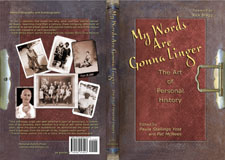Resources—A Growing CollectionThis is one section you will want to bookmark so you find the latest resources relating to personal stories, family histories, ethical wills and legacy statements, genealogy, research, memoir writing, oral history, and more. Resources for personal historians and anyone interested in preserving their stories for future generations span a wide variety of materials. We want to help you find what you are looking for and maybe introduce you to some new ideas too. Memory TriggersAnything that triggers memories will be a great help in your quest to preserve your stories. This article from the New York Times, called 'You Might Remember This' by Jeff Scher does just that. There's a story and a short video, which is fun to watch. StoryCorpsStoryCorps is a national oral history project to instruct and inspire people to record each others' stories in your own voice. At the StoryCorps booth in New York City, people record short interviews with the help of a trained facilitator or a friend or family member. The recordings are given to the participants and also added to the StoryCorps Archive at the Library of Congress. Excerpts from the interviews are broadcast on NPR's Morning Edition each Friday. At the StoryCorps website, you can listen to many of the recordings, download a free Do-It-Yourself recording guide and learn more about how you might participate. Veterans History ProjectThe Veterans History Project of the American Folklife Center?Congress created this project. Its primary purpose is to archive the personal narratives, correspondence and visual materials of U.S. veterans who served in World Wars I and II, the Korean War, the Vietnam War, the Persian Gulf War and the Afghanistan and Iraq Wars. The project relies on volunteers to collect and preserve the stories of veterans, war industry workers, USO workers, flight instructors, medical volunteers and others supporting the wars' efforts. A memoir guide and an interviewing guide can be downloaded from the site, as well as suggestions for how interviewers might find local funding for the interviews. The collected materials are housed in the Library of Congress. Some of the stories and photos have been digitized and can be viewed online. |

 My Words Are Gonna Linger: The Art of Personal History
My Words Are Gonna Linger: The Art of Personal History